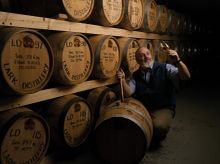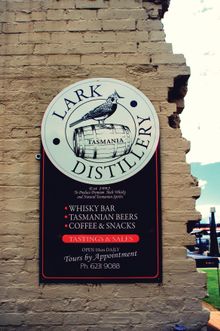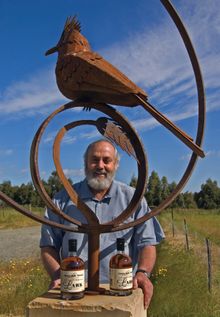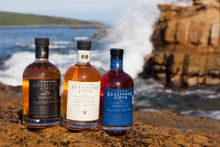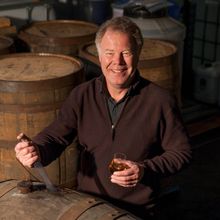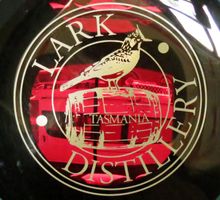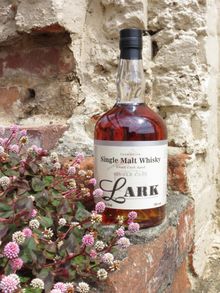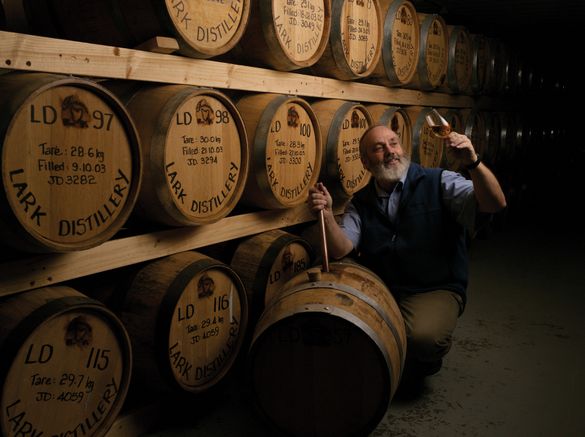 20 Mar 2015
20 Mar 2015
To say colonial Tasmanians enjoyed a whisky or two would be an understatement. But Tasmanian whisky today isn't the bootleg version of old - it's pure, it's handcrafted and now, internationally award-winning.
Bill Lark, the godfather of Australian whisky has been inducted into the Hall of Fame at the World Whisky Awards in London, the very first person from the southern hemisphere and only the seventh person outside Scotland to be inducted. It's an incredible achievement for a developing industry, particularly when being judged against fine Scotch and Japanese whiskies produced in very established distilleries.
Bill's achievement is nothing short of outstanding for a relatively young and developing industry. Bill shared from London, “What a night for me, and for the Tasmanian industry. To be recognised among the best in the world is a complete honour.” Bill went on to say, “It creates such awareness for the Tasmanian industry and allows us to rub shoulders with the best, on the world stage. Tonight, I've had guys like Ian Chang of Kavalan Distillery (who won the World's Best Single Malt Whisky category this year) offer to have me in his distillery. That's a big deal!”
But Bill wasn't the only winner, Tasmania Distillery, which produces Sullivan's Cove Whisky won the Icons of Whisky award for Craft Distiller of the Year this year. Sullivan's Cove took out the Best Australian Single Malt award for the third year in a row with the French Oak chosen as the best single malt to come out of Australia in 2015.
Sullivans Cove Whisky is made traditionally, using only Tasmanian ingredients. There's no chill filtering involved nor any colours or flavours added. Each barrel is bottled individually to capture subtle variances that occur from barrel to barrel, resulting in one of the best whiskies on the market today.
But to understand the true significance of the awards, lets get back to history.
The story so far…
To get through the burgeoning colonial years, any Hobartian worth their salt knew where to get their hands on whisky. Legal and illegal, small scale whisky distilleries were growing as fast as European settlement, dotted along the banks of the Derwent River and the freshwater Hobart Rivulet. But all this changed in 1839 when Governor John Franklin was the ultimate kill-joy and took a stand against 'public drinking excesses' by outlawing distilleries. The amendment allowed for large distilleries to still operate, but they needed to be so large it was prohibitive. He effectively shut down the industry by shutting everyone out.
His law stood until 1992 when new pioneer Bill Lark was granted the first small-scale distillery licence in 150 years, to open Lark Distillery. Lark Distillery has become one of Australia's leading distilleries, producing high-quality, premium single malt whisky using traditional methods. Their boutique distillery is dedicated to producing high-quality malt whisky and other unique Tasmanian spirits. Lark whisky is crafted in small batches and matured in small barrels, and five to seven years later bottled by hand.
The industry has been growing ever since and today there are ten distilleries and two independent bottlers in Tasmania.
Why Tasmania? Why whisky?
Whisky-making activity in Tasmania has been driven by a combination of a rapidly growing international demand for 'new world' whiskies and the fact Tasmania is blessed with pristine water, superb malting barley, highland peat bogs and a highly desirable cask maturing climate. It's a distillers dream down here and now the rest of the world is beginning to sit up and listen.
What's new with Tasmanian whisky?
Redlands Estate Distillery in the Derwent Valley is one of only two 'barley to bottle' single malt whisky distilleries in the world, and the only one outside Scotland. Their first barrels were laid down last year, so we're all waiting with alcohol-bated breath to taste it in June 2015.
The Distillery does everything onsite – barley is grown in the fields and malted onsite, water is drawn from their Plenty River water frontage, and the whisky mashed and distilled in the circa 1857 granary building. A cooper prepares and fires barrels on the spot, and the whisky is left to mature in their heritage Oast House. Redlands Estate Distillery uses barrels sourced from local Tasmanian vineyards and the provenance of each barrel can be tracked from the field to the glass. Visit www.redlandsestate.com.au.
There's no better way to learn about Tasmanian whisky than visiting the distilleries to talk and taste with the distiller. Visitors can now explore the newly formed Tasmanian Whisky Trail, connecting the distilleries to meet the passionate people behind the world-class whiskies. You'll also discover the areas that make these whiskies so special. Visit www.taswhiskytrail.com to learn more about the makers and map your journey.
You can go behind the scenes and learn more about Tasmanian whisky making, by joining a Tasmanian Whisky Tours group for the day. You'll visit three to four distilleries and taste ten Tasmanian single malt whiskies. You'll meet the distillers and see exactly how the distillation process works. And the best part, you're guided and drive through spectacular Tasmanian landscapes from the Derwent Valley, to the Central Highlands and the Tasman Peninsula, learning more about how the pristine environment produces such incredible whisky.
Depending on your itinerary, tours visit Lark Distillery, Tasmania Distillery (Sullivans Cove), Old Hobart Distillery (Overeem), Redlands Estate, Nant, Belgrove and William McHenry & Sons at Port Arthur. Tours cost $199pp and are all-inclusive, with exclusive tour discounts for any bottles purchased on the day, and an inclusive picnic lunch of seasonal local Tasmanian produce from the famous Wursthaus Kitchen. Visit www.tasmanianwhiskytours.com.au for more information.
The William McHenry & Sons Distillery invite guests to become a distiller for a day with their hands-on four hour Gin Workshop. The session includes a flavour-matched lunch and 500ml, a fine spirit personally labeled, to take home. Guests will use their unique Tasmanian made water-jacketed electric heated 500L copper pot still which allows the distiller to control to the distilling process more precisely. www.mchenrydistillery.com.au
Current Tasmanian Whisky Producers
Lark Distillery
www.larkdistillery.com.au
Old Hobart Distillery (Overeem)
www.oldhobartdistillery.com
Tasmania Distillery (Sullivans Cove)
www.sullivanscovewhisky.com
Belgrove Distilllery
www.belgrovedistillery.com.au
Nant Distillery
www.nant.com.au
Hellyers Road Distillery
www.hellyersroaddistillery.com.au
William McHenry & Sons (Three Capes)
www.mchenrydistillery.com.au
Redlands Estate Distillery
www.redlandsestate.com.au
Fannys Bay Distillery (Tasmania's newest distillery)
Shene (selling in 2016)
www.shene.com.au/shenedistillery
Independent Bottlers
Heartwood
www.heartwoodmaltwhisky.com.au
Trappers Hut
www.trappershut.com.au
For a full and up-to-date listing of Tasmanian events, and information on travelling to Tasmania, visit the Discover Tasmania website www.discovertasmania.com.au.
Travel to Tasmania
Travellers can fly to Tasmania on Jetstar, Virgin Australia, Qantas, Qantaslink, Tigerair, Sharp Airlines or Rex Airlines, or take the Spirit of Tasmania ferry from Port Melbourne (VIC) to Devonport (TAS).
Background Notes
Tourism Tasmania's role is to maximise the contribution of tourism to Tasmania's economic growth. Tourism Tasmania is a Statutory Authority operating under the Tourism Tasmania Act 1996, and is part of the Tasmanian Government's Department of Economic Development, Tourism and the Arts.
Media Contact
Joshua Iles

